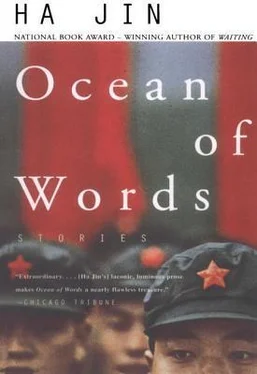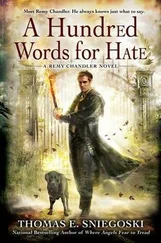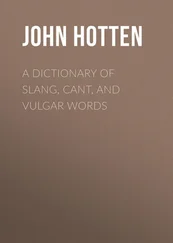A week later, we all moved into our new barracks, and for the rest of the year I didn’t see Dragon Head again. It seemed that I had indeed washed my hands of whatever he did.
3
Because the Chinese and Russian governments had started to negotiate, the situation at the border was much less intense than it had been the previous year. Except for three days’ combat readiness in early March, it was rather peaceful throughout the winter. We spent most of the time carrying out drills and criticizing Lin Biao, who had plotted to assassinate Chairman Mao. It seemed the Russians had changed their minds and would not invade our country anymore. Over seventy of our older soldiers were demobilized in January. By now we had completely dissolved our contact with Dragon Head and his men. Even Commissar Diao no longer believed that we might need the militia as foot soldiers to defend our cannon emplacement.
When spring arrived, I gave orders that each battery must open up wasteland as much as it could and sow soybeans and vegetables. That was the way to improve our food quality. Soybeans were vital, for out of them you can make oil, tofu, and soy milk. The next step was to raise pigs; every battery had to get thirty piglets. I told the soldiers, “Now we must learn not only how to fight but also how to live.”
Dragon Head had not changed a bit. His men would still ride to the Wusuli River to keep watch on the Russians. Very often, when hoeing in the fields, we could hear gunshots — they never stopped practicing. Because we lived in our own barracks, we had no dealings with them. I ordered my men not to be mixed up with the militia without my or Commissar Diao’s permission.
One summer afternoon we were planting cabbages near our barracks. As I was fetching water from a ditch with a pair of buckets, an explosion thundered in the north. Then some shells landed randomly, and numerous dark smoke pillars rose in the woods and in the fields. Large fireballs bounced along on the plain. One shell whistled by over our heads and exploded two hundred meters away in a valley. This is war. The Russians are bombarding us. I dropped the buckets and ran back to the barracks.
Orderly Liu blew the bugle, and all our men dashed to the cannons. But I had no idea what orders I should give next. I called the Regimental Headquarters, and they didn’t know what was going on either. “What am I supposed to do? Wait to be shelled in the barracks?” I yelled at the staff officer on the phone.
“Old Gao” — Regimental Commander Zhang Yi spoke now — “it’s not war. Remain where you are. We’ll know the truth soon.” The phone was hung up.
Carrying my binoculars, I scrambled to the top of the hill to have a view of the northern land. There they were. Through the glasses I saw Dragon Head and his men, about twenty of them, riding desperately back along a path through the birch woods. Two Russian gunboats on the river were firing at our side aimlessly. To my surprise, another boat, full of smoke, was motionless, and its crew were leaving it. They jumped into the water, swimming to the other boats.
“Damn it, it’s Dragon Head’s men,” I told Commissar Diao, who had just come up, gasping for breath.
“Let me have a look.” He took the binoculars from me and watched.
“It seems that the militia had a skirmish with the Russians on the river,” I said.
“A gunboat is sinking, but I can’t see the militia.”
“Let me have a look again.” I got the binoculars and watched. Now the disabled boat had disappeared, while the other two were retreating to their base. The gunfire had stopped. Everything had returned to normal.
Half an hour after we came back to the barracks, Dragon Head and his cavalry arrived. Commissar Diao and I went out to meet them. All the horses were sweating, and some of the militiamen stood by their horses, bareheaded. Dragon Head couldn’t help laughing. “Record a merit for us, Commander Gao and Commissar Diao,” he shouted. “We got rid of one of the Russians’ river rats.”
“Who gave you the orders to do it?” I asked.
“We did it ourselves. What an experience. Bang, just one bazooka shot, and it crept no more. We lost nothing but some caps.”
“You should not have done it, Dragon Head,” I said loudly, “The surface of the river is a neutral zone. This may cause a war.”
“War? Sure, we’re fighting a war with the Russians, aren’t we? That’s why you’re here.” He looked irritated. “Tell me, Commander Gao, which side are you on?”
“Cool it, Comrade Dragon Head.” Commissar Diao intervened. “I will report the victory to the Regimental Headquarters. I assure you that the Party and the people will not forget this heroic deed. Now you fellows return home and have a good rest. We will inform you of the merit soon.”
“On your horses!” Dragon Head ordered. They all leapt into their saddles. “Commissar Diao, I’ll wait for your word,” he said from the back of his black horse.
“Sure, you wait,” Diao returned in a low voice.
They all dashed off, leaving behind a dusty cloud. I turned to Diao and asked, “Why did you call it a victory?”
“Don’t be angry, Old Gao. Is a name so important?”
“I don’t know how to play on words, Comrade Commissar. Neither do I bear a grudge against Dragon Head personally. He’s a brave fellow, I agree. But this is a matter of principle — we must never fire the first shot.”
“I won’t argue with you, because what you said is absolutely right. But we had to find a way to dismiss him, didn’t we?”
I didn’t answer, although I had to admit to myself that he was not wrong. We went separately to the batteries to explain to the leaders what had happened.
The final decision arrived two weeks later. No merit citation was awarded to Dragon Head, but his militia company received an internal commendation which said: “Let the Invaders Come but Not Return.” I was bewildered. Why should the higher-ups praise the militiamen? Did they intend to encourage them to provoke the Russians again? Then why did we have to obey the orders not to fire the first shot? When I raised these doubts with Diao, he smiled and said, “You wait and see. It’s not over yet.”
As he predicted, a month later the Military Department of Hutou County issued an order that required all the militiamen to turn their weapons over to the Military Department. From now on, private possession of these weapons would be dealt with as a crime. Because every piece of arms had been listed and numbered, each militiaman had no choice but to hand in whatever happened to be in his hands. Even a dagger or an ammunition belt had to go. At once, Dragon Head’s company was disarmed.
“In a way, I feel sorry for them,” I told Commissar Diao one day. “They have had guns for quite a few years, then suddenly everything is gone.”
“You have a good heart, Old Gao,” Diao said, laughing.
I laughed too. “It must feel like you had a tidy sum in the bank yesterday, then overnight you’re penniless.” Although I said this, I did believe it had to be done that way. It was not safe to have so many civilians armed with guns when the Russians didn’t seem eager to attack anymore.
The disarmament delivered a considerable blow to Dragon Head. A month later I ran into him in Guanmen Village, where I had my leather shoes repaired. I stood at the door of the cobbler’s shop, watching with amusement a group of kids forcing a bear cub to climb to the top of a flagpole that rose in the middle of the village square. “Up, up,” they shouted. Two long bamboo poles were poking the young animal from beneath. A boy catapulted a pebble at the rump of the bear, which at once sprang up two meters.
Here came Dragon Head. He walked alone, his feet kicking away horse droppings now and then. His head drooped forward, as though he were watching his own shadow. The front of his gray jacket was open, revealing a large red character “Loyalty” on his white undershirt. He saw me standing by and turned his head away. His right hand moved unconsciously to his flank, which one of the Mausers used to occupy.
Читать дальше











